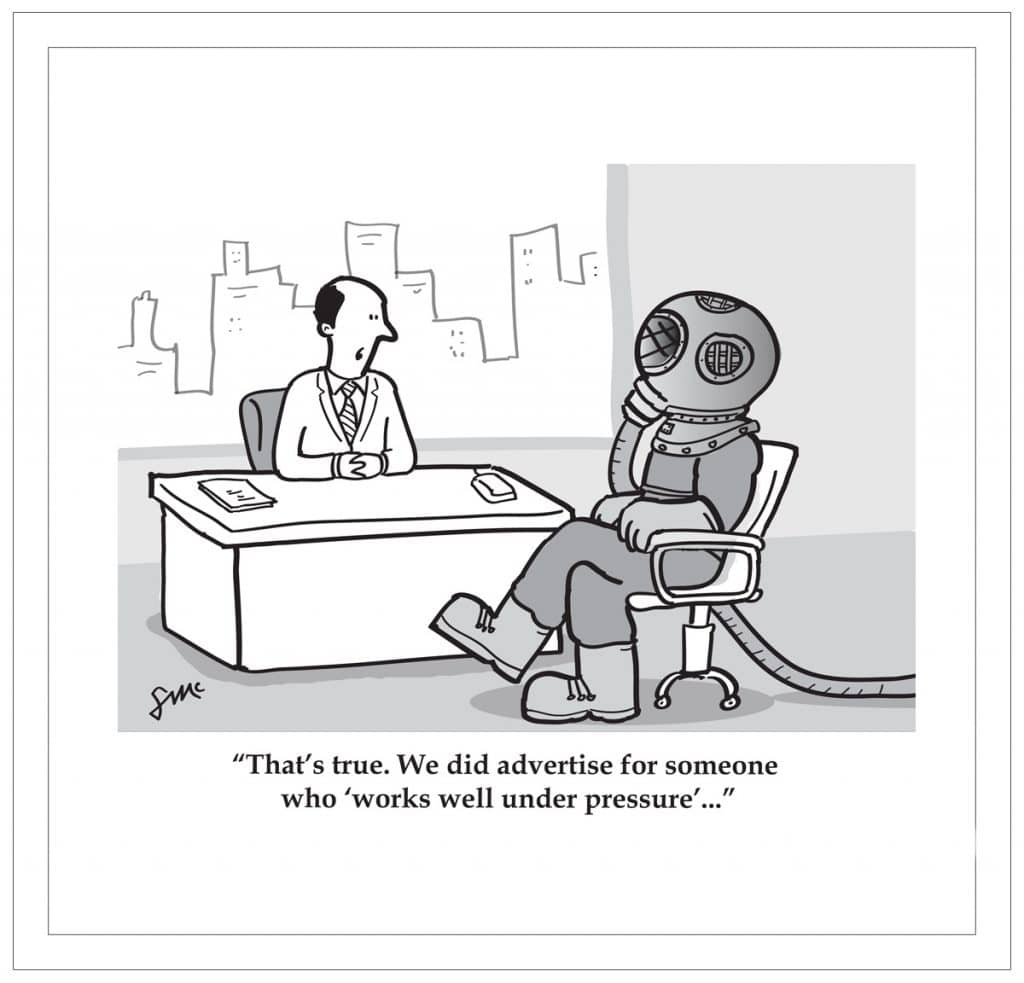Video interviewing is officially in vogue!
Thanks to the COVID-19 pandemic, this job interviewing approach has gone from the fringe to the mainstream. It means you, as a jobseeker, need to be ready for a potential video interview at any stage in the recruitment journey.
Today I’ve compiled 10 of the most common tricky questions that you can expect to be asked. Mind you, these are not the usual “tell me about yourself” garden variety questions – there are already plenty of guides on the Internet that show you how to answer them – including one of mine.
This guide covers some of the more challenging, unusual questions that you may be asked in a video job interview. Let’s get stuck into them without further delay.
(By the way, your video interview may be preceded by a phone interview – take a look here for common phone interview questions – and best possible answers).

By the way, if you’d like to take your video interviewing skills to the highest level, consider using premium job interview coaching services. We offer these remotely, to clients in Sydney, Melbourne, Adelaide, Brisbane, Canberra, Perth and beyond.
1. How Do You Think Your Co-Workers Would Describe You, Both Good And Bad?
What They Want To Know:
How self-aware are you? How much do you favour personal growth over the preservation of your existing habits? How much are you committed to adopting a growth mindset? This question probes for your willingness to proactively seek feedback from your colleagues and supervisors, then use the answers you receive to improve your performance.
Example Of A Bad Answer:
“Who cares?” or “They probably think I’m kind, nice and hard-working.”
Example Of A Good Answer:
“My former colleagues have said that I’m easy to work with and display a “can do” attitude. A less positive side of me that a former boss has pointed out is that I can bristle when overwhelmed with work. It was a very useful piece of feedback and I’ve since used it to resolve issues through effective communication, so that overwhelm doesn’t occur.”
2. How Would You Spend A $1 Million Marketing Budget? How Would You Measure ROI?
What They Want To Know:
This is known as a “case study” question – and a version of it may be asked for HR, sales or technical roles. The interviewer gives you a hypothetical business problem and asks you to rely on your experience and skills to drive an outcome. This is about showing a clear knowledge of the company’s goals and interests, as well as a smart critical eye.
Get very specific and don’t be afraid to ask questions of your interviewer for clarity. Remember – this video interview question is designed to unearth HOW you think – not WHAT you come up with.
Example Of A Bad Answer:
“I’d split the budget evenly between all major lead acquisition channels.”
Example Of A Good Answer:
“As most companies have found, segmentation and personalisation in marketing are the most effective drivers of revenue. I would begin by investing a portion of my marketing budget in data analytics, then leverage the data to increase the efficiency of all major lead generation channels. I’d then revisit the data to ensure that I’m achieving ROI.”
3. Why Do You Want To Work In This Industry?
What They Want To Know:
If you’re asked this question during a video interview, remember not to get carried away with the surface-level aspects of the role. It’s designed to make sure that you understand the brutal realities of the job, and stick around when the going gets tough.
Example Of A Bad Answer:
“I want to work in fashion because love to shop for clothes.”
Example Of A Good Answer:
“My interest in fashion, and in your brand, in particular, stems from my unique take on the industry. For most people, fashion is just another word for the clothes that they wear. For others, it’s a means to manufacturing an elevated identity. For me, fashion – when done well – adds to well-being and mental health by helping us create a positive, healthy self-image. I see a broader good in your company’s mission.”
4. Why Do You Want To Leave Your Current Job?
What They Want To Know:
First of all, let me say this – this video interview question is a waste of time. It doesn’t do anything beyond testing your ability to provide a politically correct answer. Yet, employers feel compelled to ask it because it provides them with a degree of subconscious comfort. Don’t badmouth your past employers and focus on the positives – and you’ll be fine.
Example Of A Bad Answer:
“I can’t stand my boss.”
Example Of A Good Answer:
“I’ve learned so much in my current role, and have made a huge amount of difference to the organisation, but now I’m looking to broaden my horizons and to sink my teeth into fresh challenges.”
5. Do You Have Any Questions For Me?
What They Want To Know:
Realistically speaking, by the time you get asked this question, you should be familiar with broad, base details of the role. This is your chance to ask more nuanced, detailed questions about the company’s plans and challenges – and, in doing so, demonstrate your ability to help with their execution.
Example Of A Bad Answer:
“No.”
Example Of A Good Answer:
“Yes, I do. I applied for this role because I love what you’re doing in the market. I’d love to understand what the near future holds. What do you see the team/company/department achieving in the next few years?”
6. What Did You Most Dislike About Your Last Job?
What They Want To Know:
Ha, just like the “Why Did You Leave Your Past Employer” question above, this question baits you into badmouthing your employer. Theoretically, it’s designed to unearth underlying resentments and conflicts. In reality, as I mentioned above, it simply encourages political people to be political.
Example Of A Bad Answer:
“My boss was a jerk.”
Example Of A Good Answer:
“That’s a tough question to answer. I’m grateful for my time with this company; I’ve had the privilege of working, and learning from, some remarkable people. I’ll be entirely honest with you – it was a culture mismatch. I’m a very action-oriented, data-driven person. Lately, I’ve been finding myself spending hours in meetings that rarely led to any actionable steps. I wanted to be part of a team where I’m measured by the results I achieve.”
7. Why Were You Made Redundant?
What They Want To Know:
This question has been more popular during the layoffs of the COVID crisis. It’s a tough question to answer because many employers aren’t told exactly why they were made redundant. The best way to tackle this question is to answer as honestly as possible.
Example Of A Bad Answer:
“It was politically motivated decision.”
Example Of A Good Answer:
“As I’m sure you’re aware, the economy has been in decline and my company felt the effects of it. I was part of a large staff reduction and – quite honestly – that’s all the insight I have. I am certain, however, that the decision to make my role redundant had nothing to do with my job performance – this is clear from my achievements. For example…”
8. Where Do You See Yourself In 5 Years?
What They Want To Know:
What they really mean is: “If I hired you today, will you jump ship as soon as a better opportunity comes along, or when times get tough?” You can calm the employer’s nerves by indicating that you hope to stay with the company for a while and establish yourself as someone who helps the company succeed.
Example Of A Bad Answer:
“I hope to be retired in Mexico – a-ha.” or “Relaxing on a beach in Maui.
Example Of A Good answer:
“Great question, thank you. I think about the future a lot. In the next five years, I hope to hone my leadership skills so that I eventually develop and lead new projects, represent the company externally to key stakeholders, and am seen as someone with deep expertise in cybersecurity.” You can also gently point the question back at the interviewer, and ask where they see the company in five years. This presents an opportunity for you to form an early connection.
9. What Salary Are You Looking For?
What They Want To Know:
The ghastly salary question. Salary negotiation is an art and an art form, and is beyond the scope of this article. However, I do encourage you to study this guide to salary negotiation from HBR before you start interviewing.
Example Of A Bad Answer:
“You go first. How much were you planning to offer?”.
Example Of A Good Answer:
“I’d expect to be paid the appropriate range for this role, based on my 15 years of experience in sales. I also think a fair salary would take the high cost of Sydney rents into account.”
10. If You Had To Live Your Life Over Again, What One Thing Would You Change?
What They Want To Know:
This is one of those “culture” interview questions. Your answer to the question isn’t that important; it’s designed to provide the interviewer with a sea of detail that they’ll zero in on in their follow-up questions.
Example Of A Bad Answer:
“My decision to be a salesperson!”
Example Of A Good Answer:
“Although I’m very happy with my career and life in general, having the benefit of hindsight tells me that I should have gone to university earlier. Finishing my Masters of Finance degree was a pivotal point in my life, and if I did it earlier, I would have had more opportunity to hone my skillset.”
I really hope that the answers above have been useful to you. All the best in your job search and remember – video interviews are not as terrifying as they seem.
